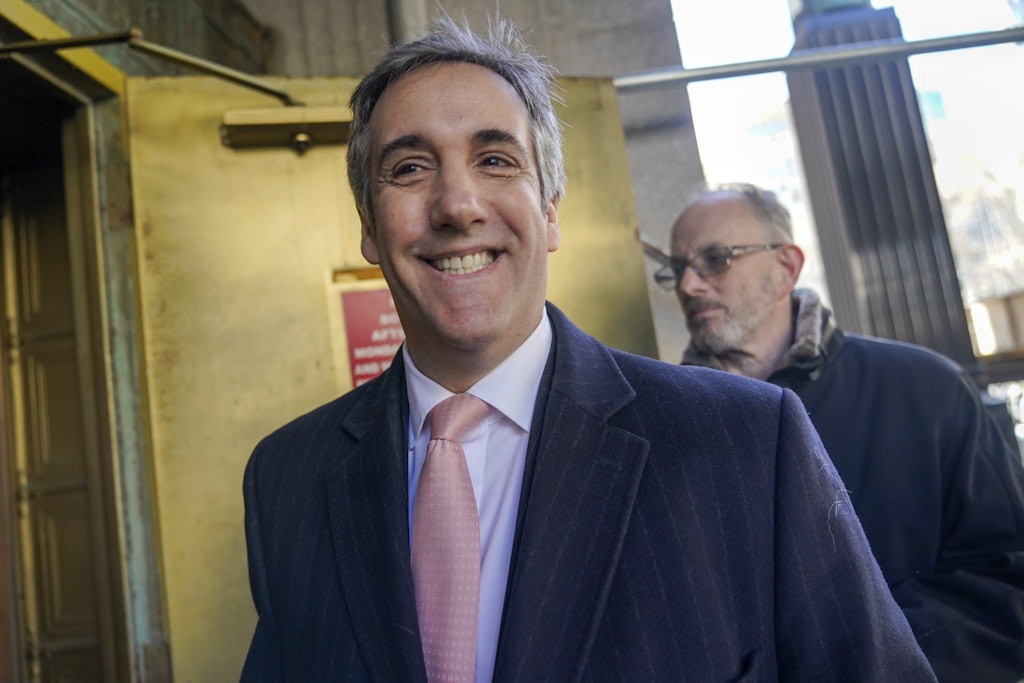
Donald Trump’s former lawyer and fixer Michael Cohen arrives for a second day of testimony before a grand jury on March 15, 2023, in New York.
Photo: Mary Altaffer/AP
There are many funny aspects to former President Donald Trump being arrested on Tuesday in Manhattan. But a little-noticed one is that if Trump had had better lawyers, he likely could have gotten away with his alleged schemes to cover up unflattering stories without any legal entanglements at all — including paying hush money to Stormy Daniels, the ultimate basis for all the charges he now faces.
Moreover, with just a little bit of extra care, it might have gone completely unnoticed.
The same things generally apply to the National Enquirer, which was forced to pay a fine for its own hush money payments to former Playboy playmate Karen McDougal over her relationship with Trump.
One thing to understand is that there’s a lot about McDougal in the prosecutors’ statement of facts, but none of the charges involve her. The National Enquirer angle is there to establish that Trump was focused on covering up the Daniels story because of the election rather than, say, him trying to prevent his wife Melania learning about it.
This is important because Trump is charged with 34 counts of falsifying business records, which becomes a more serious crime if he acted in order to conceal a second crime, such as violating laws involving political campaigns.
First of all, hush money payments are, by themselves, totally legal. The fact that Trump paid off Daniels is not a problem, from the perspective of the justice system. This is all ultimately about fraud allegedly committed in service of violating other unspecified statutes, possibly campaign laws.
Political campaigns for federal office are required to disclose their contributors, i.e., who gave them what. Crucially, contributions include not just cash donations, but also in-kind donations of goods or services. Campaigns must disclose how they spent their money.
According to Trump’s lawyer and fixer at the time, Michael Cohen, Trump arranged for Cohen to send $130,000 to Stormy Daniels to keep her quiet during Trump’s 2016 presidential run. Then, the Trump Organization, Trump’s corporation, wrote some of the checks reimbursing Cohen, claiming this was for legal expenses rather than a reimbursement. (Trump used personal funds for the remaining checks.)
One of the charges to which Cohen later pleaded guilty was making an excessive campaign contribution. At the time, the maximum contribution an individual could legally make to someone else’s campaign was $2,700, obviously far less than $130,000.
It’s also illegal for corporations to donate directly to federal campaigns. Trump later used his company’s money to reimburse Cohen, which is why another charge to which Cohen pleaded guilty was causing an unlawful corporate contribution.
However, Brendan Fischer, a campaign finance expert at the organization Documented, told me that Trump should have been fine with slightly different paperwork. “If Trump had paid Daniels using personal funds or campaign funds,” said Fischer, “and properly reported the transaction on FEC reports, then legally he would have been in the clear.”
Here’s how this would have solved all of Trump’s purely legal problems:
Thanks to the Supreme Court’s 1976 ruling in a case called Buckley v. Valeo, contribution limits don’t apply to individuals giving to their own campaigns. You can donate as much as you want. In 2016, Trump wrote $66 million in checks to himself.
So Trump could have sent $130,000 directly to Daniels, as long as his campaign disclosed this as an in-kind donation. And paying Daniels with his personal money would have eliminated any problems with laws about corporate contributions to campaigns. Alternatively, Trump could have had a check sent to Daniels from his campaign, as long as the campaign disclosed the disbursement.
If anyone is looking for a good lawyer, I would strongly suggest that you don’t retain the services of Michael Cohen!
— Donald J. Trump (@realDonaldTrump) August 22, 2018
Of course, this could have generated nonlegal embarrassment when his campaign disclosed the contribution or disbursement — exactly what Trump was anxious to avoid in the first place.
However, Fischer contends, “the FEC has allowed for the creation of a number of disclosure loopholes, so there are arguably legal ways that Trump may have made the hush money payment without tipping off voters. For example, Trump might have paid Daniels through a law firm, or through a newly-created LLC, with only a vague description of the purpose.”
In other words, the (alleged) convoluted scheme for which Trump has been indicted was essentially pointless, and his lawyers, including Cohen, should have told him so at the time.
Trump had every reason to tweet, back in 2018, the day after Cohen pleaded guilty, “If anyone is looking for a good lawyer, I would strongly suggest that you don’t retain the services of Michael Cohen!”
This content originally appeared on The Intercept and was authored by Jon Schwarz.
Jon Schwarz | Radio Free (2023-04-05T15:34:07+00:00) Trump (Allegedly) Broke the Law for No Reason. Retrieved from https://www.radiofree.org/2023/04/05/trump-allegedly-broke-the-law-for-no-reason/
Please log in to upload a file.
There are no updates yet.
Click the Upload button above to add an update.
